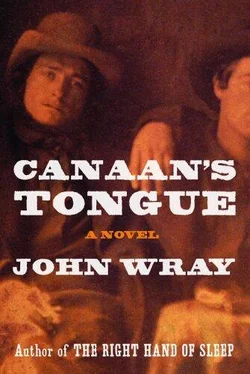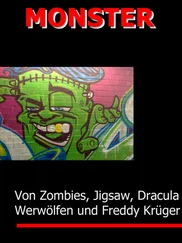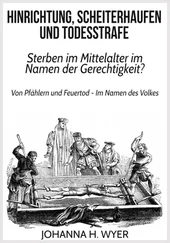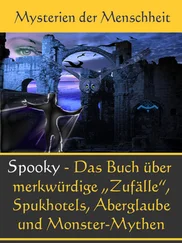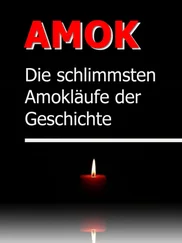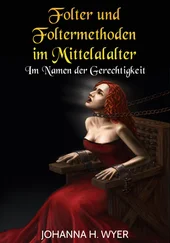As if reflected in a puddle I see Kennedy’s form. More than that—: the cold against my chest tells me. Here he comes. Did I stop running? Did I sink to my knees? I did. I kneel slumped against a tree, the very last before the lawn, letting the mash pour out of my open mouth. I wait on Kennedy’s convenience. His shadow crosses against the light and there’s no house suddenly, no still, no boiler, no Mother Anne, no Delamare, no Trade.
I’m grateful for that much.
He stands still for a moment, potato-faced and breathless, wheezing and sputtering and cursing me to heaven. And yet pleased to see me—: to see me kneeling in the mud, the bright mess in front of me and down my clothes.
“You called my name,” Kennedy says, chambering his gun. He must have fired at least once. “You called it, Oliver, as you run.”
The cold climbs up my body like a reward. “I haven’t forgotten your name, Irish. You drove it into me. Remember?”
His potato-face pivots. “You shut your muh! — muh! — mouth.”
Three steps past him the forest ends. It’s raining on the naked ground and I can smell the clay. A pale blue blot, the figure of a man, moves toward us through the grass. Is it my end approaching?
“You dipped into a well meant for niggers, Kennedy,” I say. “You dipped into it and drank. What does that make you?”
“Nobody heared of it,” he says, thumbing back the hammer. “If nobody heared of it, it never was.”
“An honorary nigger, Stuts,” I say. “And something else besides.”
I look up at him against the trees, branches twitching in the rain, bullets dropping sweetly from the pines. A shout comes from the house. “You surely want to die,” he says.
I wait to see his features before I answer.
“Parson knows what you did to me, Kennedy. I told him. So does Dodds.”
He strikes me across the forehead with the barrel. My left eye shuts and gushes. “You,” says Kennedy. “You little nuh! — nuh! — niggra boy.”
I half-believe that he is weeping.
“Kennedy!” Virgil shouts, crashing through the brush. “Leave off it, Kennedy! Harvey left a letter!”
So Virgil was behind it, after all.
“Little boy,” Kennedy says, bringing down his boot.
Goodman Harvey’s Narrative
On this the night of 11 May 1863 I make my peace with the Lord my Creator & leave this record of my many errors, trusting in His power to see the causes that are hid to all but prophets. I am no Papist & write these lines not to serve as a confession, for I do not believe in redemption at the eleven’th hour; but rather to reckon with the Angel of Death, pale & luminous as a pearl, who stands attentively at my left shoulder.
I do so easefully, recollecting my forty-two years with the calm of one about to forget them for all time. I have, in fact, been waiting on this night for many months; I find myself embracing the prospect eagerly, almost coquettishly, like a virgin bride. Had I not known my Friend was coming I’d have done away with myself weeks ago; but this end, I believe, is better. My lot has ever been to defer to those greater than myself.
I first heard of Thaddeus Myrell in the spring of my fourth year in the Territories. A born child of Mormon, I’d been sent into the west at the age of eighteen to herald the arrival of the Latter-day Saints to an gross & unwitting nation. Mine was the particular honor of bringing word to the Indians encamp’d in the Oklahomas, one of the fabled Lost Tribes of Israel; from my earliest youth I’d been a passionate believer, & I set out on my mission in the highest of spirits, greatly pleased with myself as an agent of God’s will. My cousin Alva & I vow’d not to return home to Nauvoo, Illinois, until seven years had gone by, or the entire country south of the Cimarron river had been brought into the Church. We were happy, unencumber’d boys, younger than our years, who imagined the west as a vast quilt of green gorges & dappled fields — a somewhat grander Illinois. Neither of us was ever to see the country of our youth again.
What happen’d over those first three years is of little relevance to this accounting. Alva died four months into our mission, of gastritic fever; my own trials, though less decisive, were hardly less severe. Important is only that I suffer’d, that my zeal & good works were repaid with mockery & violence in those God-hating swamps, & that my own house of faith was thrown open to the four winds, so that the Prophet Himself was moved finally to abandon it. It was in this fallen state, tired in flesh & sick in spirit, scraping a living together by peddling liquor to the Chickasaws & Kickapoos & Choctaws in the guise of medicinal tonics, that I found myself one evening on the porch of a shabby grain depot, listening to two negroes chatter in hush’d tones about the coming of a new Redeemer.
“He come to Onadee last week,” the taller of them said. He was a thick-set, amicable gossip I knew well from my monthly visits. There were always one or two of his persuasion in attendance, listening slack-jaw’d to some gaudy story or other. His given name was Tempie.
“What he come there for?” the second negro asked. “To preach?”
Tempie gave a knowing chuckle. “He come to serve notice to them dirty Meth’dists up at de mill,” he said, glancing side-wise at me. Tempie had long been prisoner to the suspicion that I was a Methodist myself; someone had told him they went about in cast-o f suits of clothes.
“It’s all right, Tempie,” I said, sitting down on a sack of corn. “I won’t corrupt your immortal soul this evening.”
In answer Tempie shot me a look I’d long since grown used to from negroes & white men alike. “I ain’t one you sick Indians, Mr. Harvey.”
“Go on, already,” the other negro said. “How he sized? Big or little?”
Tempie puff’d his chest out as far as it would go. “Ah! He big enough,” he said, spreading his arms wide. “Big as this. Voice like rattling thunder.”
His friend looked dubious. “Mr. Wallace say he call himself the Baby of the West.”
“He a baby, all right,” Tempie said, grinning. “He gonna shake his rattle till them rich folk in Onadee drops they purses & runs.”
“A confidence-man, is he?” I ask’d innocently.
At this the second negro looked at me as though I’d crawl’d out of a hole in the ground. “He a prophet,” he said. “Come to set the peoples right. Mr. Wallacesay he gone sweep the territory clean of heathens.”
Tempie snorted & waved a hand. “Mr. Wallace say,” he japed, puffing out his cheeks. Turning side-wise on his heels, he privileged us with a shuffling dance in parody of John Wallace, his master, who su fer’d grievously from fallen arches.
It was Tempie’s misfortune that Wallace, a hard man leach’d of all generosity by ten years in the Territories, chose that moment to come out of the house. “Tempie,” he said sedately. “You come over here to me.”
Tempie took off at once in the direction of the granary. His companion back’d himself against the wall & stay’d there, quiet as a beam. Wallace watch’d Tempie go, shifted his weight with a diffident grunt, cuff’d the other negro across the ear & turned his attention grudgingly to me.
“Inciting my niggers to mischief, Harvey?” he said, looking at me with unadorn’d distaste. “Been feeding them your cure-alls, peradventure?”
“Beg pardon, Mr. Wallace,” I answered quickly, my voice rising as it always does when addressing men of property. “We’ve been discussing the new preacher up in Onadee.”
Читать дальше
